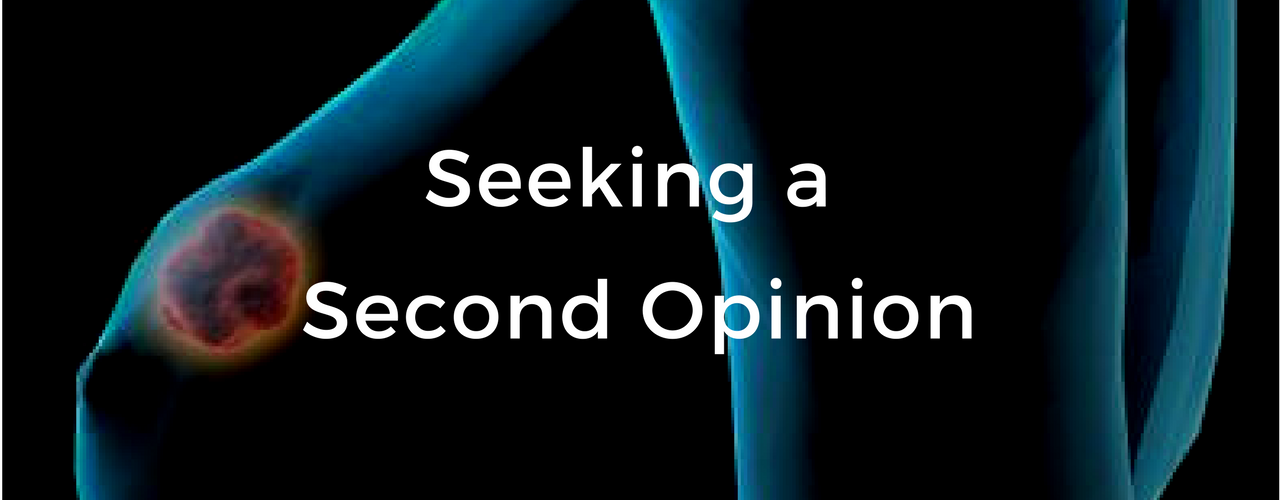Questions for your doctors about second opinions:
- Do you recommend I seek a second opinion?
- What other treatment options might I encounter with a second opinion?
- Should I get a second look at my biopsy by an outside pathologist?
- Would a second reading of my mammogram or breast MRI be helpful?
Questions to ask yourself about second opinions:
- Do my specialists seem interested in working hard to help me?
- Do I get a sense he or she is excellent in their field?
- Do I personally feel comfortable with my physician?
When should you consider a second opinion?
Be reassured that most newly diagnosed patients do not need a second opinion. We outline here a few situations in which you may benefit from seeking a second opinion about your breast cancer.
- When you have a very unusual type or complicated breast cancer.
- When your surgeon or oncologist recommends a second opinion.
- When a clinical trial is available for your unique situation.
What are the advantages of a second opinion?
- Reassurance and confirmation that your physician and breast cancer team is approaching your situation correctly.
- A possible offer of a different approach to treating your cancer. You can then weigh the advantages and disadvantages of both approaches and make a more informed decision.
What are the disadvantages of a second opinion?
- This process can sometimes significantly delay beginning your cancer care. Depending upon the facility and availability of the second opinion appointment, the delay can be a few days to many weeks.
- If you do choose to return to your original physician to seek your cancer care, your surgery, chemotherapy, or radiation therapy will likely be delayed by your second opinion. However, if you work with your initial specialist to help you coordinate a second opinion as outlined below, he or she may likely work to continue scheduling therapies while you are seeking other ideas. It is much easier to resume your care if your physician is engaged in your seeking a second opinion.
How do I best seek a second opinion?
- Ask your surgeon or oncologist who they would recommend you see. They know who is the best in your area. This also indirectly asks them the question, “Are there any other services that are offered elsewhere that are not available here?” They can be very helpful in facilitating this referral and sharing your medical records for your second opinion. If your surgeon/oncologist appears offended when you ask this question, this is an indication that you may benefit from a second look at your breast cancer treatment options.
- Conduct your research. Look online for NAPBC accredited Breast Centers in your area. Contact the “Patient Navigator” at the breast center you are considering a second opinion. He or she will be very helpful in having you “worked in” to a physician’s busy schedule to have second look at your unique breast cancer situation.
What is a breast biopsy, “pathology second opinion?”
An incorrect reading of your breast biopsy can dramatically change your physician’s approach to your problem. Sometimes it is challenging to accurately determine whether breast cells are benign, atypical, precancerous, or an invasive breast cancer. Your pathology slides can be sent to an outside reference lab if there are questions about the certainty of a diagnosis with your local pathologist.
In 2015, actress Rita Wilson publicly shared that a pathology second opinion of her breast biopsy showed invasive cancer, after initially being read as a more benign condition. A good commentary of her second opinion is located (here).
Breast biopsy pathology second opinions are not routinely ordered. Here are a few situations that can generate sending pathology slides to a reference lab. Ask your breast surgeon if a second reading would be helpful in your unique situation.
- If the reading was performed at a very small hospital pathology laboratory.
- If the reading suggests one of the following diagnoses: atypical lobular hyperplasia (ALH), atypical ductal hyperplasia (ADH), lobular carcinoma in-situ (LCIS), or lobular intraepithelial neoplasia (LIN).
What is a breast “imaging second opinion?”
Formal requests for second readings of mammograms, breast ultrasounds, and breast MRIs are rare. But if you visit another institution for a second opinion to treat a newly diagnosed breast cancer, it’s commonplace to have a new, formal reading by that institution’s breast radiologists.
The most reassuring second opinion is when your breast surgeon offers to review your imaging with your radiologists. This action shows engagement in your care and can add further insight into your breast cancer situation.
Patient-Friendly References:
- breastcancer.org
This detailed outline (here) “Getting a Second Opinion” is about all aspects of seeking a second opinion for breast cancer. This non-profit organization provides excellent patient resources about breast cancer.
- lbbc.org
“Getting a Second Opinion” (here) is well outlined on this site. Living Beyond Breast Cancer is a non-profit organization dedicated to providing quality information about breast cancer to patients.
- cancer.net
This 4-minute audio podcast (here) outlines “Seeking a Second Opinion.” It is not specifically focused on breast cancer but provides information to help patients and their families make more informed decisions about care. The American Society of Clinical Oncologists is a leading organization of clinicians who care for cancer patients.
- cancer.org
There is general information (here) about “Seeking a Second Opinion” on this page that is not specific to breast cancer. The American Cancer Society is an organization that supports patients with cancer and funds research for cancer of all types.



